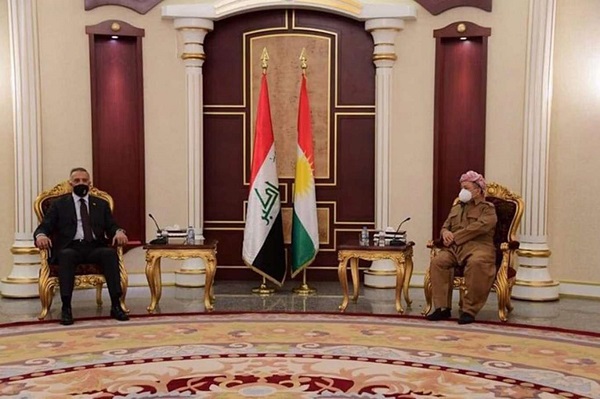Alwaght- Iraqi Prime Minister Mustafa al-Kadhimi arrived in Erbil on September 10 for his first visit to the Kurdistan region since he assumed the office May for talks with the autonomous region’s leaders.
Al-Kadhimi was received in Erbil’s airport by Kurdistan Regional Government (KRG) PM Masrour Barzani. The reception ceremony was attended by Deputy PM Ghobad Talabani, presidential aids Jaafar Sheikh Mustafa and Mustafa Qader, and also KRG’s Interior Minister Rebar Ahmad.
Al-Kadhimi was accompanied by Foreign Minister Foad Hussein, Oil Minister Ihsan Abdul Jabbar, Defense Minister Jumma Anad, Communications Minister Arkan Shahab, Refugees Affairs Minister Iwan Faegh Jabru, and the Secretary-General of Council of Ministers Hamid al-Ghezzi. Al-Kadhimi met with Kurdistan Democratic Party (KDP) leader Masoud Barzani, KRG President Nechirvan Barzani, and also paid visits to the region’s Ibrahim Khalil border crossing with Turkey in Duhuk province. He also visited Parviz Khan and Bashmaq border crossings with Iran.
The visit to Erbil came while a couple of days ago a political delegation was dispatched to Baghdad led by Ghobad Talabani and met with oil, finance, and power ministers of al-Kadhimi’s cabinet, during which the Kurdish government members seem to have had positive talks with central government officials.
But what are the goals that took al-Kadhimi to Erbil? And how successful could his visit to the Kurdish region be in terms of settling Erbil-Baghdad disputes?
Two sides continue dialogue over oil
The most important topic of discussion for both sides seems to be the oil and the dispute surrounding it. Since the toppling of the Saddam regime in 2003 and the formation of a new government, Baghdad has been protesting the Kurdish signing of oil contracts with foreign oil companies to independently produce and sell oil for the Kurdish region in the north. But to the central government’s frustration, the protests changed nothing, as especially since 2009 the KRG signed an agreement with Turkey to export oil from the Turkish port of Ceyhan. During all these years, Baghdad asked the Kurds to deliver the region’s oil to the State Oil Marketing Organization (SOMO) but they never yielded to this demand.
The disagreement over Kurdistan oil sales in late 2013 led to Baghdad cutting off the region’s federal budget share under PM Nouri al-Maliki. The stalemate continued until 2018 when Adel Abdul Mahdi was picked as a new Iraqi PM. A compromise led to KRG promising commitment to deliver 250,000 oil barrels daily to SOMO and in return Baghdad promised to pay, though not fully, the budget for the region’s state worker salaries.
Evidence shows that the central government has asked Kurdistan to cut its oil production to 120,000 barrels per day in accordance with the OPEC cap. But the KRG, under pressure to keep its home financial commitments, cannot comply with the limit as its monthly expenses which include employee payments, retirement pensions, and other social security costs reach about $755 million.
Though oil is a leading matter in the al-Kadhimi talks in Erbil, reaching an agreement is difficult. The Kurds argue that the federal accumulated debts to Erbil that include unpaid budget shares are estimated to reach $27 billion. But Baghdad faces the Kurdish argument with the counterargument that the KRG has so far received more than its allowances.
Discussing 2021 budget and border incomes
Another topic of discussion of the Iraqi PM in Erbil was the Kurdish government’s share from Iraq’s national budget for next year. In addition to oil incomes, al-Kadhimi argues now that the KRG has to deliver the border and customs revenues to the federal government and in return the federal government will make payments to the northern employees. The reality is that since 2003, the KDP and Patriotic Union of Kurdistan (PUK) have made huge revenues from the border crossings with both Iran and Turkey but made no payments to Baghdad as a federal income.
But now Baghdad insists that the border crossings’ incomes have to return to the federal treasury and that the Kurds cannot have independent sources of income from this path while asking for a budget share. The PM’s symbolic visits to the three border crossings display the significance of this issue to Baghdad and it seems that the two sides made serious talks on the case.
But a look at the piled-up problems between the central government and the KRG over the past two decades can make it clear that neither al-Kadhimi nor any other person holding the post can easily solve the disputes. Al-Kadhimi during his months in office showed that beside flexibility and moderation he is firm in pursuing his policies. Therefore, Erbil visit cannot be expected to bring special privileges to the Kurdish government or fast settle the bilateral problems.



























